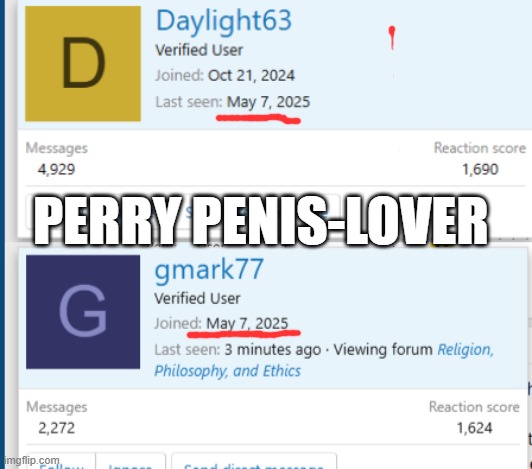The scientific ideas of string theory and the multiverse are untestable in any conventional scientific science.
They are placeholders. They will become of interest when they can be tested by science.
The scientific ideas of string theory and the multiverse are untestable in any conventional scientific science.
They are placeholders. They will become of interest when they can be tested by science.

Thanks for tacitly admitting that untestable scientific ideas and inferences have an important place in the scientific profession. I was previously told by you and your ally that anything that isn't testable is simply not allowed in the profession of science.They are placeholders. They will become of interest when they can be tested by science.
Thanks for tacitly admitting that untestable scientific ideas and inferences have an important place in the scientific profession. I was previously told by you and your ally that anything that isn't testable is simply not allowed in the profession of science.
No, they are not simply just a random 'place holders'.
They are logical inferences and deductions from existing scientific data and principles.
The Many Worlds interpretation of quantum mechanics makes very specific logical inferences based on the mathematics of quantum mechanics. It's basically a philosophical interpretation of the ultimate meaning of quantum mechanics.
Super string theory is an elegant mathematical idea that makes very specific mathematical deductions about the nature of ultimate physical reality.
No, they are not simply just a random 'place holders'.
You claimed that anything that isn't testable simply is not allowed in science.Are you familiar with what an 'hypothesis' is?
Agreed. It's his biggest tell....and also why I suspect he has developmental issues.You can always tell if Perry has changed names or registered troll accounts, by the unrelenting persistence with which he follows my threads and posts!
You can always tell if Perry has changed names or registered troll accounts, by the unrelenting persistence with which he follows my threads and posts!
Are philosophical inferences allowed in the scientific profession?
JPP peanut gallery: NO!
Physicists: YES
Nope.Ironically I'm the one defending inferential reasoning here.
Don't expect JPP's obsessive and mentally deficient to understand. It's not that they don't want to, but because they can't. Sad.Are philosophical inferences allowed in the scientific profession?
JPP peanut gallery: NO!
Physicists: YES
Philosophy of Probabilities: When we’re looking at things at the quantum level, are the probabilities inherent to the system and part of the true fabric of nature? Or are the probabilities we employ merely a proxy for our lack of knowledge? We don’t know. Quantum mechanics as it stands can’t distinguish these two cases.Maybe the outcomes of quantum mechanical events really are purely probabilistic in their very nature. In this case, a philosopher would say the probabilities are ontological—they actually exist.• Or maybe the outcomes of quantum mechanical events are deterministic, or determined by preceding events, but we the experimenters employ probabilities only as a calculational tool because of our lack of knowledge. In this case, a philosopher would say the probabilities are epistemological: The system is deterministic, but we use probabilities to model our lack of knowledge
- Erica Carlson, physicist, Purdue University
I lie so much that I even fool myself!

Nope.
Hi! I'm Perry and I love to pull my pud in public. I'm also very Smart!!!!
This isn't about God.I'm the only one here using inferential analysis. It's clear you don't understand the concept so let me explain it to you:
When I test your claim "God exists" I collect data knowing that it will be potentially in error or contain errors. I attempt to eliminate as many errors as possible but recognize they continue to exist.
Your claim "God Exists" carries with it the negative: God does not exist. But I can't test that claim since it would require that I see all of the universe simultaneously and be sure God isn't "hiding" somewhere.
A scientist, therefore tests your claim by ASSUMING the negative claim "There is no God".
The goal in inference in science is not to test the negative claim but rather to test AGAINST the negative claim.
What this means is that after analysis I have found that I fail to find sufficient evidence to REJECT THAT NEGATIVE CLAIM.
This is why I brought up court cases.
The assumption of innocence is built in. But you don't test for innocence. You test for guilt assuming there is none. You are testing against the negative claim but you are not testing the negative claim.
The final result is that I AM UNABLE TO REJECT THE CLAIM THAT THERE IS NO GOD.
That's inference 101.
And what it means is NOT "There is no God" but rather that I am unable to reject that claim and feel like I am following the evidence.
It's really as simple as that.
Argument from randU fallacy. Courtier's fallacy.
Religious Affiliation Percent of Scientists Atheist 17% Mainline Protestant 16% Agnostic 11% Catholic 10% Jewish 8% 'Nothing in Particular' 20% Other Religion 10% Evangelical Protestant 4% Don't Know/Refused 4%

Scientists and Belief
When President Barack Obama announced on July 8, 2009, that he would nominate renowned geneticist Francis Collins to be the new director of the Nationalwww.pewresearch.org
It's actually really surprising that posters who claim to be scientifically literate just simply were not aware that untestable scientific ideas, inferences, philosophical interpretations pervade the scientific profession.Don't expect JPP's obsessive and mentally deficient to understand. It's not that they don't want to, but because they can't. Sad.
No.Is there a point to this thread?
